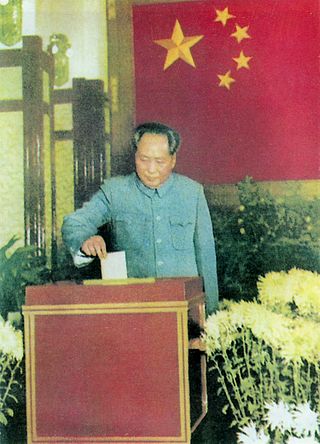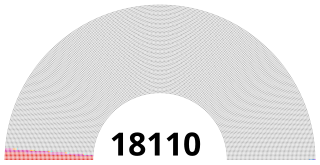
The National Assembly is the lower house of the bicameral French Parliament under the Fifth Republic, the upper house being the Senate. The National Assembly's legislators are known as députés, meaning "delegate" or "envoy" in English; etymologically, it is a cognate of the English word deputy, which is the standard term for legislators in many parliamentary systems).
An indirect election or hierarchical voting is an election in which voters do not choose directly among candidates or parties for an office, but elect people who in turn choose candidates or parties. It is one of the oldest forms of elections and is used by many countries for heads of state, cabinets, heads of government, and/or upper houses. It is also used for some supranational legislatures.

The United Civic Party is a liberal-conservative and liberal political party in Belarus. The party opposes the government of Alexander Lukashenko and has participated in the country's elections on a few occasions, but it did not have a single member in the Belarusian parliament until one member was elected during the 2016 elections. It claims that its lack of seats is due to the unfairness of the election process.

The Prussian three-class franchise was an indirect electoral system used from 1848 until 1918 in the Kingdom of Prussia and for shorter periods in other German states. Voters were grouped by district into three classes, with the total tax payments in each class equal. Those who paid the most in taxes formed the first class, followed by the next highest in the second, with those who paid the least in the third. Voters in each class separately elected one third of the electors who in turn voted for the representatives. Voting was not secret. The franchise was a form of apportionment by economic class rather than geographic area or population.
Regular elections in Croatia are mandated by the Constitution and legislation enacted by Parliament. The presidency, Parliament, county prefects and assemblies, city and town mayors, and city and municipal councils are all elective offices. Since 1990, seven presidential elections have been held. During the same period, ten parliamentary elections were also held. In addition, there were nine nationwide local elections. Croatia has also held three elections to elect members of the European Parliament following its accession to the EU on 1 July 2013.

France is a unitary semi-presidential republic with a bicameral legislature. Public officials in the legislative and executive branches are either elected by the citizens or appointed by elected officials. Referendums may also be called to consult the French citizenry directly on a particular question, especially one which concerns amendment to the Constitution.

Elections in Hong Kong take place when certain political offices in the government need to be filled. Hong Kong has a multi-party system, with numerous parties in the Legislative Council. The Chief Executive of Hong Kong is nonpartisan but has to work with several parties to form a coalition government.

Elections in the People's Republic of China are based on a hierarchical electoral system under the control of the Chinese Communist Party, whereby local People's Congresses are directly elected. All higher levels of People's Congresses up to the National People's Congress (NPC), the national legislature, are indirectly elected by the People's Congress of the level immediately below. The NPC Standing Committee may partially alter laws passed by the NPC when the NPC is not in session, which is significant since the Standing Committee meets more frequently than the NPC.

Belarus elects on national level a head of state—the president—and a legislature. The president is elected for a five-year term by the people. The National Assembly has two chambers. The House of Representatives has 110 members elected in single-seat constituencies elected for a four-year term. The Council of the Republic has 64 members, 56 members indirectly elected and eight members appointed by the president.

Elections in Belgium are organised for legislative bodies only, and not for executive functions. Direct elections take place for the European Parliament, the Chamber of Representatives, the Parliaments of the Regions, the Parliaments of the Communities, the provincial councils, the municipal councils and the councils of Districts of Antwerp. Voting is mandatory and all elections use proportional representation which in general requires coalition governments.

Elections in Lithuania are held to select members of the parliament, the president, members of the municipal councils and mayors, as well as delegates to the European Parliament. Lithuanian citizens can also vote in mandatory or consultative referendums.

The Constitution of the Republic of Belarus is the ultimate law of Belarus. The Constitution is composed of a preamble and nine sections divided into 146 articles.

The president of the Republic of Belarus is the head of state and head of government of Belarus. The office was created in 1994 with the passing of the Constitution of Belarus by the Supreme Soviet. This replaced the office of Chairman of the Supreme Soviet as the head of state. The tasks of the president include executing foreign and domestic policy, defending the rights and general welfare of citizens and residents, and upholding the Constitution. The president is mandated by the Constitution to serve as a leader in the social affairs of the country and to act as its main representative abroad. The duties, responsibilities and other transitional clauses dealing with the presidency are listed in Chapter Three, Articles 79 through 89, of the Constitution.

Vladimir Novosiad is a Belarusian politician of liberal orientation, the leader of Belarusian Liberal Party of Freedom and Progress. He was born on April 12, 1968, in Kiev (Ukraine). Variants of his name include the following: Vladimir Novosyad, Uladzimir Navasiad, Uladzimir Navasyad,. Married and has two daughters.

The electoral system of the Soviet Union was varying over time, being based upon Chapter XIII of the provisional Fundamental Law of 1922, articles 9 and 10 of the 1924 Constitution and Chapter XI of the 1936 Constitution, with the electoral laws enacted in conformity with those. The Constitution and laws applied to elections in all Soviets, from the Supreme Soviet of the Soviet Union, the Union republics and autonomous republics, through to regions, districts and towns. Voting was claimed to be secret and direct with universal suffrage. However, in practice, before 1989, voters could vote against candidates preselected by the Communist Party only by spoiling their ballots, whereas votes for the party candidates could be cast simply by submitting a blank ballot.

The Belarusian Patriotic Party is a political party in Belarus loyal to President Alexander Lukashenko. Nikolai Ulakhovich is party chairman.
The 23rd convocation local councils of Republic of Belarus elections were held in April 1999.

2010 26th convocation local councils of Republic of Belarus elections were held on 25 April.

27th convocation local councils of Republic of Belarus elections were held on 23 March 2014. 1328 Local Deputy Councils were filled with 18,816 representatives. Moreover, at the same time elections of single deputy to House of Representatives of National Assembly were held in Gomel-Navabielicki 36 electoral district where government-favoured candidate was removed from elections just before 2012 parliamentary election, and the only candidate left did not receive enough support.

28th Convocation Republic of Belarus deputies to Local Councils of Deputies elections are elections to Belarus Local Councils to Deputies elections conducted on 18 February 2018. Electoral campaign started in November 2017. Citizens of the respective administrative subdivision elect the council for a term of four years under procedure set within the Electoral Code of Republic of Belarus.















